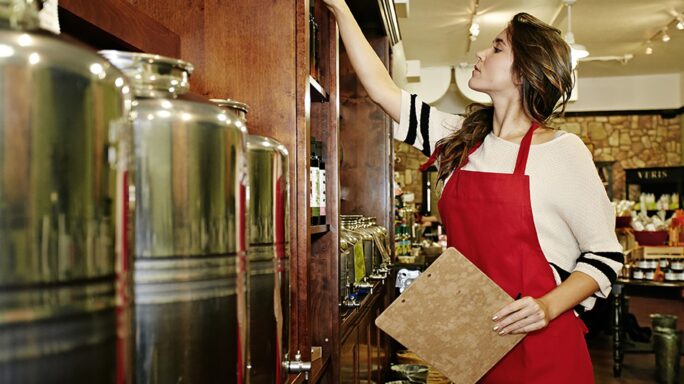Free guides & templates
Business plan template for food and drink companies

If you’re thinking of setting up a new food and drink venture, creating a business plan may not be the most exciting item on your to-do list but it’s a good idea to make it a priority.
Whether it’s a coffee shop, restaurant, bar or street food truck you want to set up, having a proper business plan in place will maximise your chances of making your dream profitable.
What is a business plan?
Successful businesses are driven by passion but your skills, enthusiasm and hard work need to be underpinned by a practical framework.
Your business plan forms the core of that framework. It’s a document that maps out the nature and purpose of your company, as well as its strengths, weaknesses and strategic goals.
Writing a business plan for your food and drink company will help you define your unique selling proposition as well as aiding your understanding of the marketplace and competition. It’ll also encourage you to establish and work towards realistic milestones that will help your business to grow.
As your food and drink business grows and the marketplace you operate in evolves, the things you’ll have to do to ensure your business continues to thrive will change too. Therefore, your business plan won’t just be a document you create as you are setting up a business.
It should be regularly updated and used to help you and your colleagues or employees continue to be a success.
Something that can also help your planning is a Business Model Canvas. It is a handy tool to help you build out your business plan.
Why should you have a business plan?
- A well-researched business plan shows that you take your catering or hospitality business seriously and if you’re looking for partners, investors or funding, you’ll most likely need one.
- Creating a business plan will help you identify any threats and challenges that your food and drink company might face, encouraging you to come up with effective solutions.
- By drafting your financial model, including cash flow and financial projections, a business plan will help you work out if, how and when your idea will make money.
- You’ll be signposting a path to business growth by planning short and long-term milestones.
- Part of your business plan requires in-depth customer analysis. Doing this means you’ll gain a better understanding of your target audiences, as well as their needs, preferences and priorities.
- You’ll be able to benchmark your company’s performance by comparing results and achievements to the goals set out in your business plan.

Want to set up your own food or drink company? Don’t forget your business plan
How to write a business plan for a food and drink company
There are no set rules for what a business plan should look like or cover. But if you plan on using it to help secure funding, there are certain things readers will expect to see in there:
- Executive summary
- Business overview
- Goals
- Audience and market
- Products and services
- People
- Financials
Following this structure will enable you to use your overarching business plan to help make decisions and run your business day to day. It will also support you in making a compelling case for investments or business loans.
It is important to take your time and be thorough in your research while ensuring the content of the plan remains realistic and factually accurate. This is critical when it comes to the financial elements of your plan, so you may want to take a look at our tips on how to get more accurate figures for your business plan.
However, that doesn’t mean it has to be a dry, boring document – investors say they invest as much in the people as they do the business – so let your passion and personality shine through.
Making the most of your business plan
As your food and drink business plan will contain lots of really useful information as well as your overall vision (with enough detail to implement it), it should be used as the starting point for many of your activities and tactical plans for specific elements of your organisation.
It’s a good idea to check in on your SMART (specific, measurable, attainable, relevant and time-based) goals monthly to make sure you’re on track, and to add constructive customer feedback to your plan.
You should also try to review your full business plan annually. Business planning is an ongoing process, so think about whether you need to update your document to reflect any changes to your company, technology, competition or the marketplace.
Ready to get started with your business plan?
Your accountant or your bank’s small business adviser may be able to give you tips and ideas, or you could use an online template. To help you out, we’ve created a business plan template specifically for food and drink businesses.
Our free-to-download template has detailed guidance notes too, which will help you include all the information necessary to help you make your endeavour a success and provide potential investors with the facts and detail they’d expect to see.
Business plan template for food and drink companies
Want to create a business plan for your food or drink company but not sure how to do it? Download our free and easy-to-use business plan template and you can get started.






Ask the author a question or share your advice